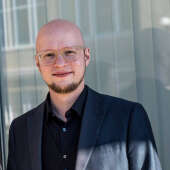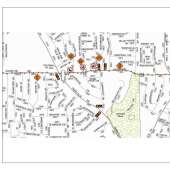A Shortage of Skilled Workers: Southeast Missouri follows national trend
Seventy percent of general contractors in the U.S. have a hard time finding qualified craft workers, according to data from a 2017 workforce survey conducted by the Associated General Contractors of America.
Robinson Construction, the fifth largest employer in Southeast Missouri according to Cape Girardeau Area MAGNET, with a total of 475 employees in 2017, says this is true not only in the U.S. but right here in Southeast Missouri.
"I'd like to know who the other 30 percent are," Paul Findlay, president of Robinson Construction in Perryville, Missouri, jokes when he hears this statistic. "There's no doubt there is a shortage of qualified workers in construction, and it's not just in construction -- you can talk to anybody who's trying to hire technically skilled people, whether it be construction or manufacturing or whatever other industry you might be in, there's just a shortage of qualified, trained people out there."
And the need is only going to keep growing. NPR reported in the article "High-Paying Trade Jobs Sit Empty, While High School Grads Line Up for University" that "construction, along with health care and personal care, will account for one-third of all new jobs through 2022, according to the Bureau of Labor Statistics." Plumbers and electricians also willbe in demand. In addition, the article reports, "There will be 68 percent more job openings in infrastructure-related fields in the next five years than there are people training to fill them."
The Bureau of Labor Statistics projects information technology occupations will grow 13 percent from 2016 to 2026, adding 557,100 jobs to the market.
And according to the Bureau of Labor Statistics, 2.4 million new health care jobs will be created by 2026, due to an aging population.
In a region where the top two employers are major hospitals, with four of the other top ten largest employers -- Procter & Gamble, Robinson Construction, Mondi Jackson and Delta Companies -- in the manufacturing and construction industries, this is a problem.
Findlay says the shortage of skilled craftspeople stems from the fact 11,000 baby boomers retire in the U.S. each day, and more than one-fifth of the construction workforce is currently 55 years old or older. This, he says, coupled with parental and societal urges over the past three decades pushing students into four-year university degree programs post-high school. With these factors combined, he says we have created our own shortage of skilled craftspeople, as well as a lack of young people willing to do manual work.
Available good jobs
In past decades, perhaps the way to get ahead financially was indeed to earn a four-year bachelor's degree. Today, that is not necessarily so.
The Good Jobs Project, a study conducted by the Georgetown Center on Education and the Workforce and JP Morgan Chase, studies the non-BA job market to find ways to help young people complete education that will prepare them for good-paying, non-BA career paths, fulfilling the nation's demand for these skilled workers; the project defines a "good job" as one whose salary pays at least $35,000 per year. According to the project, the median earnings of non-BA jobs is far above this baseline salary, at $55,000.
In addition, The Good Jobs Project found that from 1991 to 2015, a total of 3 million skilled services jobs were added to the market. It estimates there are 30 million jobs in the U.S. for workers without a bachelor's degree.
The project also breaks down numbers by state. In Missouri, a total of 70,000 unskilled blue-collar jobs were lost from 1991 to 2015, while 112,000 non-BA skilled-services jobs were created in our state's workforce. The industry creating most of these good jobs is the manufacturing industry, followed by transportation and utilities, construction, health services, and finally, information, financial activities and real estate, combined into one category. The median earnings of good jobs in these industries range from $52,000 in health service to $60,000 in transportation and utilities.
John D. Martin, a student at Cape Girardeau Career and Technology Center (CTC), has taken advantage of the opportunity available in the skilled-trade workforce. When Noranda Aluminum Inc. shut down in New Madrid in 2016, Martin was out of work. CTC gave him the option of going to work and covering part of his paycheck, or paying for him to go to school.
"I chose school," he says. "If there's an option for free college, you better take it."
Martin is earning his certification in machine tooling and his associate degree in applied science, specializing in electrical trades. He is now in the internship phase of his two-year program, doing electrical work under the mentorship of a local contractor.
It has been challenging as an adult going back to school since he has other responsibilities and people to care for, he says. During his programs, he has taken trade classes during the day and college classes at night.
The pay-off, though, is worth it: Martin says having a certification and degree from a trade school has opened up many employment options for him.
"Most of the trades, you've got a pretty good chance of getting a job once you get out. You get the hands-on -- you're out there applying what you've learned. If someone is willing to work and listen to the teachers, you're going to learn something useful that you can take anywhere. You will be a lot better worker and a lot better person."
One Solution
Tech and trade schools in the area are rising to meet the shortage of skilled laborers in the workforce. Ranken Technical College, a St. Louis-based college that opened a location in Perryville in 2017, trains students for jobs in the middle technical skills area, jobs that require a two-year degree or tech certification, such as the careers available in manufacturing, electric, construction and information technology. These types of skills comprise 57 percent of all jobs, according to Missy Borchardt, dean of enrollment at Ranken Technical College.
In 2017, Robinson Construction, TG Missouri and Gilster-Mary Lee approached Ranken Technical College to bring a campus location to the town. The goal of having the school in the community -- on TG's campus and across the street from Robinson Construction -- is to recruit students from a 60-mile radius to one of five programs, including industrial engineering technology, welding, CDL, diesel repair and information technology, providing skilled workers for these businesses and others in the area. The internship-based, two-year associate programs provide four or eight weeks of classroom learning, followed by four or eight weeks of a paid internship at a local company. All students begin the program with a paid position and employment.
"There is no shortage of jobs, but there is a shortage of skills," says Dan Kania, dean of academic affairs at Ranken Technical College in Perryville. "We are trying to meet that need."
Kania says this is a challenge all over Southeast Missouri.
"I am running in to more and more of those conversations with every company I talk to -- they need workers," he says. "It's an epidemic."
Kania and Findlay note pipefitters, pipe welders and crane operators are especially scarce. Robinson Construction has begun hiring unskilled workers for on-the-job training apprenticeships, and is also working with Ranken Technical College to provide one-year internship programs to students, to get them into the workforce more immediately.
Leveraging Southeast Missouri's work ethic
Rhiannon Davie, who graduated from Southeast Hospital College of Nursing and Health Sciences in 2017, cites the small class sizes and catering to nontraditional students as two benefits of pursuing her radiologic technology associate degree at a trade school.
After her graduation in 2017, she worked nights at Poplar Bluff Regional Medical Center.
"I was prepared to work the night shift, I was prepared to work independently," Davie says of the radiologic technology program. "I graduated and was fully prepared for the national registry exam and ready to enter the workforce."
Both Davie and Findlay note the importance of having tech schools in the region to train skilled workers for the abundance of local companies who need qualified craftspeople.
"We do benefit a lot if we can hire local people," Findlay says. "There's a desire for the people that grew up in Southeast Missouri, I think, to stay in Southeast Missouri. Everybody's migrating to the big cities. But the people that grew up in this environment, I think they tend to like to stay here. So we hope we're unique and that we can provide real opportunity for these people."
He says the work ethic of people from Perry County and Southeast Missouri is noticeably a harder work ethic than in many of the places Robinson Construction works throughout the country. He hopes to leverage this work ethic and provide the skills to young people through area technical schools and apprenticeships, filling the shortage of qualified workers.
"It's a good paying job, any way you cut it," Findlay says of the middle technical-skills positions that are available. "But you have to work hard for it, there's no doubt. There's a lot of money spent with going to college. You don't have to spend that much money to make a good wage, at least in Southeast Missouri."
Southeast Missouri is home to several trade schools specializing in training a skilled workforce. These schools provide options for recruiting workers, continuing your own education or helping your employees attain the skills they need to make your organization successful. Here are a few of the schools in our region creating solutions for the shortage of qualified craftspeople:
Cape Girardeau Career and Technology Center (CTC)
Location: Cape Girardeau
Programs offered: 14 technical programs, including auto collision, construction technology, and heating ventilation, air conditioning and refrigeration
10 health care programs, including dental assistant, physical therapy assistant and emergency medical technician
Number of students: 700
Enrollment period: Varies
Format: Day classes, evening classes, short- and long-term coursework
Other: CTC offers a variety of personal-enrichment classes, customized training for the business and industry sector, adult education and literacy, and an assessment center.
Marquette Tech Institute
Location: Cape Girardeau
Programs offered: Code Labs: Certificate/workforce development and upcoming paid apprenticeships for software development
Courses/types of study: Software development/computer programming (specifically Ruby/Ruby on Rails)
Number of students: 50 per year
Enrollment period: Program is July through December
Format: Flipped classroom model: students learn online outside of classroom on their own, and discuss solutions in a face-to-face setting during Monday and Wednesday sessions from 5:30-8:30 p.m.
Other: Code Labs is taught by local professional software developers with a 10 student-per-teaching fellow ratio. Unit 1 teaches Ruby. Unit 2 teaches Ruby on Rails.
Unit 3 students work with local tech employers on a real-world project in a team environment.
Metro Business College
Location: Cape Girardeau
Programs offered: Certification, Associate of Applied Science
Courses/types of study: Administrative Assistant, Massage Therapy, Medical Assistant, Business Administration, Medical Specialist, Medical Billing and Coding
Number of students: 50
Enrollment period: Year-round 10-week terms
Format: Combination of classroom, demonstration and practical, hands-on experience
Other: A large portion of Metro Business College’s enrollment is in the medical programs; Metro Business College is the only school in Southeast Missouri to offer Massage Therapy.
Perryville Higher Education Center, a satellite campus for Mineral Area College
Location: Perryville
Programs offered: Associate of Arts (Transfer degree), Associate of Arts in Teaching, Associate of Arts in General Studies, Prerequisites for health fields, Academic classes for Career and Technical degrees
Courses/types of study: English Composition, Public Speaking, History, Government, Physical and Biological Sciences, Business, Education, Mathematics
Number of students: 200
Enrollment period: Yearlong
Format: On-campus, Evenings, Online
Other: Perryville Higher Education Center is a satellite campus for Mineral Area College.
Ranken Technical College
Location: Perryville
Programs offered: Bachelor of Science in Applied Management, Industrial Engineering, Technology apprenticeship program, Welding Technology apprenticeship program, Diesel Technology apprenticeship program, Information Technology, Commercial Drivers License.
Number of students: 30
Enrollment period: Eight-week courses, Fall, spring, summer semesters. Continuing Education, throughout the year.
Format: On-campus, Online, Apprenticeship
Other: Apprenticeship programs are set up so students are in class for eight weeks, then work for pay for eight weeks each semester. Some programs are on four-week intervals.
Sikeston Career and Technology Center
Location: Sikeston
Programs offered: Certification
Courses/types of study: Licensed Practical Nursing, Welding Technology, Automotive Technology, Auto Collision Technology, Culinary Arts
Number of students: 40
Enrollment period: Yearlong
Format: On-campus
Other: All programs require 900 to 1,400 hours of on-site training to earn certification. Internships also are available.
Southeast Missouri Hospital College of Nursing and Health Sciences
Location: Cape Girardeau
Programs offered: Certification, Degree
Courses/types of study: Certificate for Patient Care Technician, Certificate in Medical Laboratory Science, Certificate in Surgical Technology, Associate of Arts degree, Associate of Applied Science in Nursing, Associate Degree in Radiologic Technology, Bachelor of Science in Nursing
Number of students: 170
Enrollment period: Fall, spring and summer semesters
Format: On-campus
Other: The Southeast Missouri Hospital College of Nursing and Health Studies is regionally accredited by the Higher Learning Commission. Five of their other programs have additional accreditations.
Southeast Missouri State University
Locations: Main campus in Cape Girardeau, Sikeston Regional Campus, Kennett Regional Campus, Poplar Bluff delivery site at Three Rivers College
Programs offered: Credit-bearing certificate, Associate degree, Bachelor degree, Master degree, Non-credit continuing education opportunities
Courses/types of study: More than 100 undergraduate certificates and minors available, including certificates in health care and education. More than 145 undergraduate majors available, including degrees in technology, engineering and health care. More than 75 graduate programs, including degrees in education, business and science
Enrollment period: Semester
Format: Online, On-campus, Blended: partially on-campus and partially online, Internship courses
Other: Southeast is focused on preparing students for extraordinary careers.
Three Rivers College
Locations: Main campus in Poplar Bluff; Dexter, Kennett, Piedmont, Sikeston, Cape College Center in Cape Girardeau
Programs offered: College credit programs, Certification, Degree, Workforce development
Courses/types of study: 25 Associate of Applied Science programs, including agriculture, welding and nursing
36 Certificate programs, including electrical technology, information technology and plumbing
Training options and services for businesses and industries, including Missouri New Jobs Training Program, Missouri Customized Training Program and contract training
Number of students: 3,226
Enrollment period: Fall, spring and summer semesters and 8- and 16-week sessions
Format: On-campus, Independent Television for Schools and Colleges (ITV) day and evening classes, Online classes
Other: The college’s workforce development program works with the region’s business and industry sector to provide training to upgrade the skills of the present workforce in order to meet changing demands. All of the degrees and most of the certificates offered at Three Rivers College are eligible for federal financial-aid programs.
Trend Setters School
Location: Cape Girardeau
Programs offered: Licensure
Courses/types of study: Cosmetology, Barbering, Barber Crossover, Manicuring Esthetics
Number of students: 100
Enrollment period: Rolling admissions, with cosmetology and barbering programs beginning every two to three months. Crossover programs offered periodically throughout the year, according to demand.
Format: Cosmetology and barbering are full-time, 30-hour-per-week programs. Training for all programs combines on-campus theory and hands-on practice with public customers.
Other: Trend Setters School, in its 17th year, is Southeast Missouri’s only accredited cosmetology and barbering school.


































